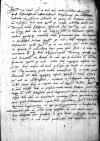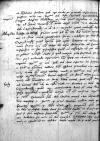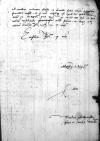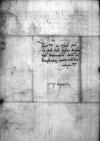Rediens ex terra Culmensi non potui me continere, quin non visitarem litteris meis Reverendissimam Paternitatem Vestram. Nobilitas - amici mei - ⌊terrarum P(russiae) superinscribed⌈P(russiae)P(russiae) superinscribed⌉⌋ dicunt fidissima obsequia sua Reverendissimae Paternitati Vestrae, quae ut semper fuit ita et nunc est superinscribed⌈estest superinscribed⌉ magni nominis et memoriae apud eosdem perpetuoque manebit. Dominum Deum superinscribed⌈DeumDeum superinscribed⌉ precantur pro diuturna et faustissima salute Reverendissimae Paternitatis Vestrae.
Dominus ⌊Nypczycz⌋ brevi constituetur apud Reverendissimam Paternitatem et ea nova, quae volui scribe paper damaged⌈[ibe]ibe paper damaged⌉re, fusius et abundius dicet, quia praesens fuit, et mihi communicata sunt per dominum ⌊thesaurarium terrarum Prussiae⌋, optimum servitorem et amicum Dominationis Vestrae, qui se commendat cum omnibus fortunis Reverendissimae Paternitati Vestrae. Vadit dominus ⌊Nypczycz⌋ missus a sacra ⌊maiestate regia⌋ ad dominum ⌊principem⌋ in causa et negotio ⌊domini thesaurarii⌋, quod accidit Pomesaniae etc., et credo, quod conveniat cum domino ⌊Nypczycz⌋ apud Reverendissimam Dominationem Vestram ⌊Ilspergi⌋ vel in ⌊Allenstein⌋.
Instinctu et instigatione ⌊Allexandri⌋ nondum accepi finem in negotio meo cum ⌊Quirino Galler⌋, Reverendissima Dominatio Vestra, tamquam dominus et praesul meus, velit scribere sacrae ⌊maiestati regiae⌋ cum omni diligentia, quod dignaretur adhuc scribere ⌊sanctissimo domino nostro⌋ et ⌊cardinali Sanctorum Quattuor protectori regni⌋, quod sollicitaret apud suam sanctitatem, quod silentium ⌊Quirino⌋ imponeretur, et ego, quod permanerem in beneficiolis meis on the margin⌈meismeis on the margin⌉ quietus, quae iam multis annis possideo etc. Nil aliud accepi pro obsequiis meis superinscribed⌈meismeis superinscribed⌉, quae praestiti a 37 annis, quam ista beneficia etc. Reverendissima Dominatio Vestra tamquam prudentissimus dominus dignabitur melius
 Bcz, 1598, p. 442
et consultius scribere, quam ego eandem Reverendissimam Paternitatem Vestram informare possem.
Bcz, 1598, p. 442
et consultius scribere, quam ego eandem Reverendissimam Paternitatem Vestram informare possem.
Velit, oro, reverendissimo domino ⌊episcopo Chelmensi vicecancellario regni⌋ diligenter negotium on the margin⌈negotiumnegotium on the margin⌉ commendare et litteras, quod expedire et scribe hidden by binding⌈[e]e hidden by binding⌉re ad curiam Romanam digneretur superinscribed⌈dignereturdigneretur superinscribed⌉. Mitto iterum alios 20 ducatos domino ⌊Czarnkowski⌋ et iam 40 exposui, quos maluissem distri hidden by binding⌈[ri]ri hidden by binding⌉buisse et dedisse fratribus meis, sed cum ita dominus Allexander on the margin⌈⌊Allexander⌋Allexander on the margin⌉ voluit, oportet me et fratres meos patienter ferre. Intellexi ex litteris domini hidden by binding⌈[i]i hidden by binding⌉ ⌊Czarnkowski⌋, quod ⌊Quirinus⌋ fuit optime contentus et voluit omnia facere, nisi nunc iterum eum misit ⌊Allexander⌋ ad curiam instigasset et sibi persuasisset, quod non cessaret etc., qui nondum hidden by binding⌈[um]um hidden by binding⌉ ex ⌊Gdano⌋ rediit. Credo, si quid accepit pro fo ms. a(!)
⌈oo ms. a(!)
⌉caria ex curia hidden by binding⌈[ria]ria hidden by binding⌉ Romana, quod redeundo aperiat.
Cum his me commendo et hoc hidden by binding⌈[c]c hidden by binding⌉ negotium Reverendisimae Paternitati Vestrae, quam dominus Deus dignetur diu sospitem et felicem in omnibus reddere, dominum assiduis precibus oro. Venit mihi obviam frater meus ⌊Nicolaus⌋ eundo a Reverendissima Paternitate Vestra, qui dixit hidden by binding⌈[ixit]ixit hidden by binding⌉ mihi Reverendissimam Paternitatem superinscribed⌈PaternitatemPaternitatem superinscribed⌉ Vestram brevi missuram ad aulam enixe percontatum hidden by binding⌈[tatum]tatum hidden by binding⌉, velit eidem committere et dare litteras meas, quod easdem dare ad manus domini Hosii on the margin⌈HosiiHosii on the margin⌉. Nam in eisdem mitto 20 ducatos et litteras domini hidden by binding⌈[i]i hidden by binding⌉ Czarnkowski, quas ⌊Romam⌋ transmittere debet cum aliis litteris prius expeditis. Quod si superinscribed⌈sisi superinscribed⌉ non inerit vel non miserit Reverendissima Paternitas Vestra ⌊Cracoviam⌋ suum, tunc cursor meus iter continuabit hidden by binding⌈[it]it hidden by binding⌉ litteris acceptis a Reverendissima Paternitate Vestra Cracoviam. Mallem tamen, quod hidden by binding⌈[d]d hidden by binding⌉ servitor Reverendissimae Paternitatis Vestrae iret propter pecuniam, quam mitto hidden by binding⌈[to]to hidden by binding⌉ in litteris inclusam ms. s(!)
⌈mm ms. s(!)
⌉. Mitto duos servitores, equitem et cursorem, quod si suum miserit servitorem Reverendissima Paternitas Vestra, tunc uterque ad me redibit. Sin vero non, tunc cursor continuabit iter ⌊Cracoviam⌋ et equester ad me redibit.
Dabit veniam Reverendissima Paternitas Vestra, quod ita hidden by binding⌈[ita]ita hidden by binding⌉
 Bcz, 1598, p. 443
ad eandem audacter scribo et committo fatis tamquam integerrimus servitor eiusdem Reverendissimae Paternitatis Vestrae. Nihilque est apud me, quod non superinscribed⌈nonnon superinscribed⌉ esset totum et integrum pro Reverendissima Dominatione Vestra, ut(?) nisi ut sciam mentem, voluntatem paratus sum omnia subire et iterum atque iterum commendo me superinscribed⌈meme superinscribed⌉ gratiae eiusdem Reverendissimae Paternitatis Vestrae.
Bcz, 1598, p. 443
ad eandem audacter scribo et committo fatis tamquam integerrimus servitor eiusdem Reverendissimae Paternitatis Vestrae. Nihilque est apud me, quod non superinscribed⌈nonnon superinscribed⌉ esset totum et integrum pro Reverendissima Dominatione Vestra, ut(?) nisi ut sciam mentem, voluntatem paratus sum omnia subire et iterum atque iterum commendo me superinscribed⌈meme superinscribed⌉ gratiae eiusdem Reverendissimae Paternitatis Vestrae.
 Bcz, 1598, p. 442
et consultius scribere, quam ego eandem Reverendissimam Paternitatem Vestram informare possem.
Bcz, 1598, p. 442
et consultius scribere, quam ego eandem Reverendissimam Paternitatem Vestram informare possem.
 Bcz, 1598, p. 443
ad eandem audacter scribo et committo fatis tamquam integerrimus servitor eiusdem Reverendissimae Paternitatis Vestrae. Nihilque est apud me, quod non superinscribed⌈nonnon superinscribed⌉ esset totum et integrum pro Reverendissima Dominatione Vestra, ut(?) nisi ut sciam mentem, voluntatem paratus sum omnia subire et iterum atque iterum commendo me superinscribed⌈meme superinscribed⌉ gratiae eiusdem Reverendissimae Paternitatis Vestrae.
Bcz, 1598, p. 443
ad eandem audacter scribo et committo fatis tamquam integerrimus servitor eiusdem Reverendissimae Paternitatis Vestrae. Nihilque est apud me, quod non superinscribed⌈nonnon superinscribed⌉ esset totum et integrum pro Reverendissima Dominatione Vestra, ut(?) nisi ut sciam mentem, voluntatem paratus sum omnia subire et iterum atque iterum commendo me superinscribed⌈meme superinscribed⌉ gratiae eiusdem Reverendissimae Paternitatis Vestrae.



